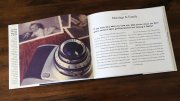“Don’t rush into getting married.” “Retire to something—not from something.” “Exercise daily, watch your diet, and do what you most enjoy.” “One of the best things that can happen is to get fired.” “Don’t hurry through your life.” “If you truly listen to your inner voice, I feel that you will end up doing something very meaningful and worthy of your best efforts.”
Though these words of wisdom could come from any modern psychologist, they are actually part of the book and companion website If I Knew Then, put together by Harvard Business School’s Class of 1963 on the occasion of their fiftieth reunion. Funny, honest, and poignant, the book is divided into chapters on such topics as “Life’s Lessons,” “Leadership,” “Marriage & Family,” and “Turning Points.” Each of the 11 chapters begins with a variant on the question, “If you knew then what you know now,…,” followed by an introduction and snippets of advice from various members of the class.
The brainchild of class secretary Arthur W. Buerk, M.B.A ’63, If I Knew Then contains vignettes from nearly 100 of his classmates. “Reading through the hundreds of submissions, many (in fact, most) gave the sort of answers you'd expect: treat your employees well, take risks, have clearly stated business goals, don't expect money to bring you happiness,” said Larry Asher, a friend of Buerk’s who helped him produce the book and website. “But an equal number were surprising in their candor, humanity, and humor.”
According to Buerk and Asher, the book has permanence, while the website is meant to be a living document. Readers can “like” and comment on alumni quotes just as they would with a Facebook post; the quotes receiving more “likes” then slide up to the top of their section so they can be read first. Alumni can also add their photographs and biographical notes, and can submit new thoughts and advice over time.
“The truly essential questions of life simply haven’t changed that much in the past 50 years. Or the past 500,” reads the book’s introduction. “The human experience is not defined by our relationship to technology or business or money. It’s about our relationships with each other. The enduring themes of love, family, faith, and self-acceptance are the ones we most seek to understand with the benefit of some inspired, experienced guidance.”









